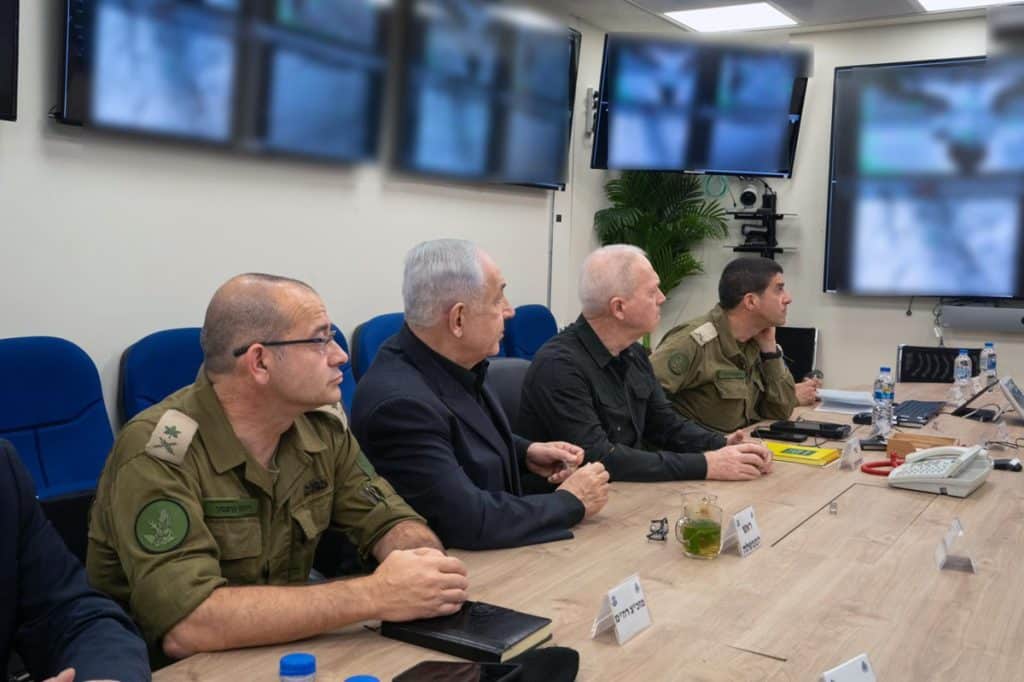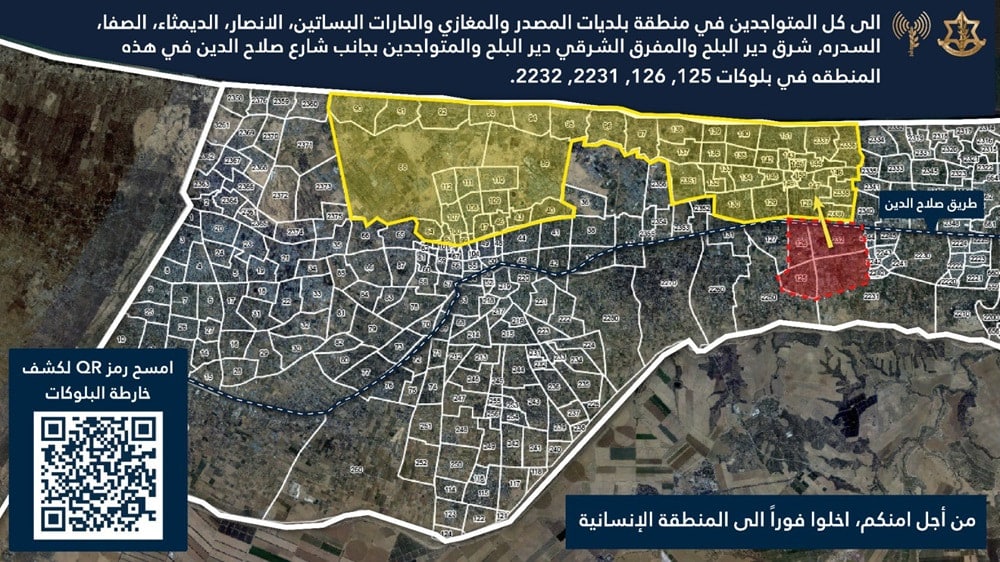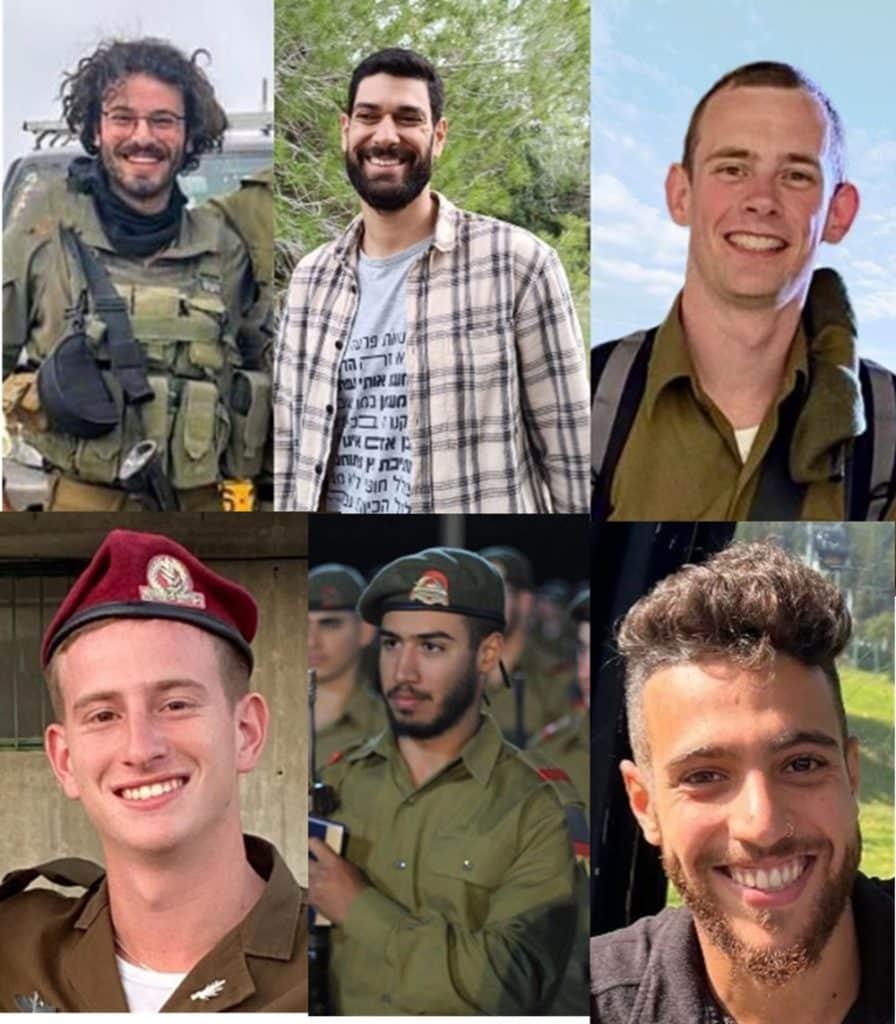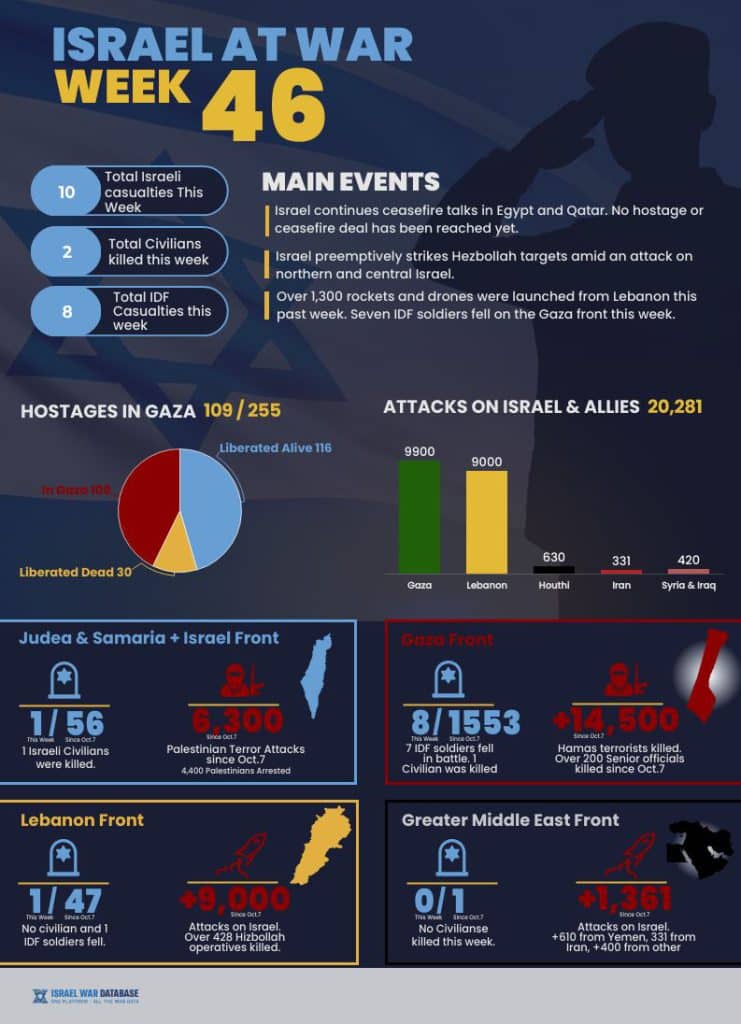
Overview
- On Sunday, Hezbollah had planned to carry out a revenge strike following the assassination of its commander, Fuad Shukr, on July 30. Dozens of launchers with thousands of rockets had been prepared to be launched, hundreds of rockets were aimed at several military targets in northern Israel, and at least several dozen UAVs were programmed to strike central Israel. Israel successfully preempted the attack with 100 aircraft destroying the launchers in 40 different areas.
- Hostage release/cease-fire negotiations continued on Saturday, between delegations of the Mossad, Shin Bet, the Prime Minister of Qatar, the head of Egyptian intelligence, and the CIA Director. Khalil al-Hayya from Hamas was present but only “listened” to the talks, but did not participate.
- New details have been released about the recovery of hostage bodies. The bodies of six hostages were extracted from a 10-meter-deep tunnel shaft in Hamed (the Towers neighborhood), leading to a network of tunnels.
- The IDF has undertaken an operation to expand the Nezarim Corridor. Soldiers from Division 252 eliminated over 200 terrorists.
- Approximately 150 tunnels have been identified beneath the Philadelphi Corridor.
- An attempted suicide bombing occurred in Tel Aviv. A suicide bomber, terrorist carrying a backpack with a powerful explosive device was on his way to Bloomfield Stadium in Tel Aviv. The bomb detonated prematurely in an area that was largely desolate.
- Abbas Araghchi, Iran’s new Foreign Minister, stated: “On the condition of abandoning the hostile approach and attempting to revive the JCPOA and lift sanctions, we seek to reduce tensions with Washington and restore relations with European countries.”
Planned Retaliation for Shukr Assassination and the IDF’s Preemptive Strike
On Sunday, August 25, 2024 at 5:00 AM, Hezbollah had planned to carry out a revenge strike following the assassination of its commander, Fuad Shukr,, on July 30. Dozens of launchers with thousands of rockets had been prepared to be launched, hundreds of rockets were aimed at several military targets in northern Israel, and at least several dozen UAVs were programmed to strike central Israel. (including Unit 8200’s base and the Mossad headquarters in Glilot), and at least several dozen UAVs were set to strike central Israel. Israel successfully preempted the attack with 100 aircraft destroying the launchers in 40 different areas in southern Lebanon, destroying thousadnds of rocket and rocket launchers an operation commanded directly by the IDF Chief of Staff from the Kirya underground command center. The successful preemptive defensive strike prevented Hezbollah from launching even one UAV or rocket at central Israel. However, between 4:45 AM and 7:40 AM, nearly 200 alerts were triggered in northern Israel . Hezbollah launched around 200 rockets and 20 UAVs at northern Israel during the morning and early afternoon hours. Many of the UAVs and rockets were intercepted, but in Acre, a residential building was damaged by shrapnel from an interception.
International
- Israeli Foreign Minister Israel Katz expressed opposition to the two-state solution, tweeting on X, “Iran and Hamas have taken over the Palestinian issue.” He added, “A Palestinian state means an Iranian base in Gaza and the West Bank, just like in Lebanon, Yemen, Syria, and Iraq—threatening population centers, flight paths, shipping routes, and economic hubs in Israel. We must not let this happen.”
- Australia will take command of the maritime task force in the Red Sea and the Gulf of Aden starting in October, according to a statement from the Defense Ministry in Canberra.
- Russian President Vladimir Putin visited Baku, Azerbaijan’s capital, and met with Azerbaijani President Ilham Aliyev. Following Putin’s visit, Azerbaijan officially applied to join the BRICS organization.
Gaza Strip
Diplomatic
- Defense Minister Yoav Gallant and U.S. Defense Secretary Lloyd Austin spoke by phone about the regional situation, with Austin emphasizing the need for a hostage deal and a ceasefire.
- The Chairman of Hamas’s Shura Council, Mohammed Darwish, along with a delegation from the terrorist organization’s leadership, met with Islamic Jihad Secretary-General Ziad Nakhaleh and his deputy, Mohammed al-Hindi.

Hostage Deal
The timing of Hezbollah’s attack was not coincidental. The hostage release/cease-fire negotiations continued on Saturday, between delegations of the Mossad, Shin Bet, the Prime Minister of Qatar, the head of Egyptian intelligence, and the CIA Director. Khalil al-Hayya from Hamas was present but only “listened” to the talks, but did not participate, as the terrorist organization had already declared it would not take part in them. U.S. President Joe Biden spoke by phone with the Prime Minister of Qatar to expedite the acceptance of the deal. Biden also spoke with Netanyahu to pressure him to withdraw Israel’s demand to retain control the Philadelphi Corridor and withdraw from at least part of it (1-2 km in the Tel Sultan area), in order to reach an agreement, a position to which Netanyahu is firmly opposed. Israel plans to establish eight observation towers along the route (one every mile), while the U.S. wants to mediate the construction of only two towers. Egypt opposes any permanent IDF presence on the route and wants to see a gradual Israeli withdrawal from the Gaza Strip.
Senior Egyptian officials told Reuters they are open to the presence of an international peacekeeping force for up to six months but reject the possibility of a permanent IDF presence along the Philadelphi Corridor.
A Western diplomat, describing Israel’s demands in the U.S.-led talks, said it appears that “the U.S. has accepted Netanyahu’s proposed changes, including the continued Israeli military presence on both corridors.”
U.S. Ambassador to the United Nations, Linda Thomas-Greenfield declared that a deal is “just around the corner” and urged Hamas to accept Biden’s mediation offer, which Netanyahu had already agreed to. In the coming days, the Qatari Foreign Minister and Prime Minister are expected to visit Tehran to pressure Iran to accept the American ceasefire proposal.
According to a report in the Qatari newspaper Al-Arabi Al-Jadeed, the Israeli delegation arrived in Cairo with a new proposal based on the one presented by Blinken during his visit to Cairo earlier in the week. The proposal called for a permanent presence of a UN monitoring delegation along the Philadelphi Corridor at specific fixed points. The agreement would also include an additional EU delegation on the Palestinian side of the Rafah crossing, that would be posted alongside Palestinian Authority representatives, to reopen the crossing. The proposal did not include an immediate withdrawal of IDF forces but rather a gradual withdrawal, according to a set timeline.
A senior Egyptian official, speaking with American officials, added that if there were to be a deal, that would achieve the return of the hostages, Israel must commit to not assassinate Hamas leader Yahya Sinwar from the moment of the deal onward.
Hamas has formally rejected the latest ceasefire proposal, yet negotiations are scheduled to recommence on Monday in Cairo. Hamas’s refusal stems from its desire for conditions that would ensure its survival and ability to rearm, which would include a long-term ceasefire that would allow for the re-integration of terrorists throughout the Gaza Strip. Israel’s insistence on controlling the Philadelphi and Nezarim Corridors would prevent Hamas from smuggling weapons from Sinai during the ceasefire (which could last up to six weeks), and preventing them from reinforcing the remaining pockets of resistance in northern Gaza. Hamas also demanded that released security prisoners should be transferred to the Gaza Strip or Judea and Samaria to reinforce their ranks as opposed to Israel’s preference to exile them from either territory.
Operational
Central Camps
Rescue of Hostage Bodies from Gaza Tunnel
New details have been released about the recovery of hostage bodies. The bodies of six hostages were extracted from a 10-meter-deep tunnel shaft in Hamed (the Towers neighborhood), leading to a larger network of tunnels. These hostages were initially taken alive into the tunnel and were found with bullets in their bodies. There is a possibility that some of the hostages died with their captors from a fire that suffocated the tunnel with smoke. The IDF engaged in a fierce 24-hour battle in Hamed, Khan Younis through which the IDF achieved operational control, marking the fastest operational control of such a territory, achieved so far in the Gaza Strip. Precise intelligence, generated through the interrogation of captured terrorists, allowed for the efficient discovery of this tunnel.

- The IDF has undertaken an operation to expand the Nezarim Corridor. Four soldiers were killed in action, battling for control ofi the Zaytoun neighborhood during a military operation aimed at expanding control over a strategic route. Three soldiers died from injuries while scanning a house, and one was killed in an RPG strike. Soldiers from Division 252 eliminated more than 200 terrorists in their operations. The operation’s goals included locating and destroying all the underground tunnels that have yet to be discovered in the area and to establish a division between the northern and central Gaza Strip.
- The Paratroopers Brigade completed its mission in the Hamed neighborhood and have moved to the Bani Suheila neighborhood, (where another evacuation order was issued on Friday), to eliminate pockets of resistance and destroy terror infrastructure.
- The 7th Armored Brigade is advancing on the outskirts of Deir al-Balah, where they eliminated dozens of terrorists in recent days. The fighting is currently on the city’s outskirts, slightly west of Salah al-Din Road, but not inside the city due to the density of the civilian population.
- In Deir al-Balah, the IDF unit “Yahalom” destroyed a 500-meter-long Islamic Jihad tunnel. Operations in this area demonstrate the operational freedom that the IDF has established for itself and the disintegration and ineffectiveness of the terrorist battalions. Only two functioning Hamas battalions remain: Deir al-Balah and Nuseirat Battalions.
- Division 98 eliminated several terrorist cells and destroyed terrorist infrastructure in its area of operation between Khan Yunis and Deir al-Balah. The IDF Spokesperson in Arabic reiterated the order for residents of four blocks in the Marazi camp and east of Deir al-Balah to immediately evacuate to the humanitarian area. This came after a similar order for residents of 19 blocks, including those in Bani Suheila and other neighborhoods, to immediately evacuate to Al-Mawasi.
Gaza City Area
- Under the direction of Military Intelligence, Shin Bet, and Division 252, the Air Force attacked a school in the Zaytoun neighborhood of Gaza City that served as a gathering area for terrorists, a weapons depot, and a command-and-control center. The division launched an operation on Friday to clear the neighborhood of terrorist activity and expand control of the Nezarim Corridor northward.
- Under the intelligence guidance of Military Intelligence and the Shin Bet, Israeli Air Force planes attacked a separate compound at the “Salah al-Din” school in Gaza City, where Hamas terrorists had gathered to plan terror attacks against Israeli forces.
Rafah Area
- In the Rafah area, Division 162 fighters eliminated dozens of terrorists, while the capture of the Tel Sultan camp appears to be nearing completion. This camp was the last serious pocket ofresistance in the area, with the remaining terrorists scattered either in buildings, or in yet to be discovered tunnels.
- In recent days, Nahal Brigade fighters focused on the Tel Sultan camp. Guided with accurate intelligence, they found a large cache of weapons, including guns, vests, explosives, and intelligence documents, in a compound near a UNRWA school.
- A 700-meter tunnel was destroyed in eastern Rafah. Defense Minister Gallant conducted a situation assessment on-site and stated, “The Rafah Brigade has been defeated, and forces continue the systematic destruction of Hamas tunnels in the area.” So far, around 150 tunnels have been identified beneath the Philadelphi Corridor, with 100 of them being outdated and of low quality.
- Division 162 is racing to destroy tunnels under the Philadelphi Corridor, a process that is expected to continue through November.
Domestic Arena
- Due to manpower shortages, Defense Minister Gallant ordered the recall of reservists who were previously exempted from reserve duty during their regular service. 15,000 civilians under the age of 35 who completed regular service but were exempted from reserve duty will be called back to service..
- On August 5, the Nagel Committee was established to examine the country’s military force structure, defense budget, war costs, and post-war economy. The committee is expected to submit its conclusions by the end of December, and based on its findings, the state budget for 2025 will be determined, along with a military and economic plan for the next decade.

Lebanon
Operational
Strike on Fatah Operative in Sidon
It was reported that the Quds Force operative was eliminated in Sidon was actually a Lebanese Fatah member whose role was to recruit and smuggle weapons to Judea and Samaria. This strategic assassination is significant as it directly impacts the Quds Force and the Iranian Revolutionary Guards Itdemonstrates that Iran is smuggling weapons and building terrorist organizations in Judea and Samaria in an attempt to open a larger front against Israel, and directly support Fatah, not just Hamas, Islamic Jihad, the Popular Front, or other terrorist factions. Fatah is the official political party and organization that is governing in the Palestinian Authority and is supposed to cooperate with Israel. Yet, the Al-Aqsa Martyrs Brigades (the military wing of Fatah) have been actively fighting against Israel since the war began. This operation has now exposed that even Fatah, that many western countries view as moderate and potential partner for peace, is fully integrated into Iran’s axis of resistance.
Other
- Most of the IDF’s forces, including most brigades, are now on the northern front, where Hezbollah continues its attacks on northern Israel, and the Air Force intensifies its attacks in Lebanon, anticipating a response from Iran and Hezbollah.
- Prior to Hezbollah’s attempted attack Sunday morning, Hezbollah attacked Israel 13 times on Saturday, launching a total of 100 rockets throughout the day. A house caught fire in Kiryat Shmona, and significant damage was caused to homes in northern Israel, with several fires breaking out. The Air Force attacked a long list of terrorist infrastructure, killed terrorists who launched rockets, and eliminated two members of Hezbollah’s missile and rocket array, with a total of 10 killed, making it one of the deadliest days in Lebanon since October 8.
- The Air Force attacked at least three sites in the Homs area in Syria to prevent Iranian arms smuggling to Lebanon. According to Syrian authorities, seven civilians were injured.
Judea and Samaria
- A 14-hour anti-terror operation took place in Tulkarm, involving exchanges of fire, the detonation of explosives, and the throwing of explosives by Al-Aqsa Martyrs Brigades and Hamas terrorists against IDF forces. At least two laboratories and one terrorist operative’s apartment were destroyed in the camp, one wanted individual was arrested, and 60,000 NIS in terrorist funds were confiscated.
- An attempted suicide bombing occurred in Tel Aviv. A suicide bomber, terrorist carrying a backpack with a powerful explosive device was on his way to Bloomfield Stadium in Tel Aviv. The bomb detonated prematurely in an area that was largely desolate.
The terrorist died in the explosion, and another civilian was moderately injured. Hamas and Islamic Jihad claimed responsibility for this attack.
- In pro-Hamas channels, the failed bombing was portrayed as a renewed threat, with claims that “suicide attacks are returning.” They referenced Yahya Ayyash, “The Engineer,” to inspire activists to carry out attacks in his spirit. Additionally, they added the phrase “Ayyash is coming” to reinforce the symbolism. Notably, Hamas celebrates attacks even when they fail to produce significant results, much like how they celebrated the rocket launch towards Tel Aviv last week. They celebrate the act of launching, just as they celebrate the attempt itself—the fact that the terrorist managed to reach Tel Aviv is considered a success.
- The incitement by pro-Hamas channels operates 24/7, encouraging many Palestinians to carry out attacks, from the Judea and Samaria into Israel and sabotage critical infrastructure.
Global Jihad
- The Delhi Police announced that they successfully identified and dismantled a terror cell allegedly operating under the influence of Al-Qaeda. The operation, involving joint efforts by police forces across Jharkhand, Rajasthan, and Uttar Pradesh, led to the arrest of 14 individuals allegedly connected to the group. Reports indicate that the group was preparing to carry out a series of high-profile terror activities aimed at establishing a “caliphate” within India.
- Pentagon spokesperson General Pat Ryder warned during a press conference about the resurgence of ISIS in certain areas of the Middle East (such as Afghanistan, Iraq, and Syria).
- Four prisoners associated with ISIS murdered a guard in a prison in the Volgograd region of eastern Russia and took hostages. One of the prisoners claimed they were “mujahideen” of the Islamic State seeking revenge for their “brothers” who carried out the attack at the Crocus City Hall concert venue in Moscow.
- Turkey’s Interior Minister, Ali Yerlikaya, reported that around 65 people were arrested on suspicion of ties to ISIS across 17 provinces in Turkey.
- The new Qatari envoy to Afghanistan, Mardaf Al-Kashouti, met with the Taliban’s Minister of Culture and Information, Khairullah Khairkhwah, emphasizing the need to strengthen and continue cooperation between Kabul and Doha. Al-Kashouti also met with the Taliban’s Interior Minister, Sirajuddin Haqqani, who runs the local terror network “Haqqani Network,” and stated that the visit is of great importance to both countries. Al-Kashouti also committed to expanding bilateral relations and cooperation.
Three people were killed, and four others were seriously injured in a stabbing attack at a festival in the city of Solingen, in western Germany. The attacker fled the scene immediately after the act. According to local media, a suspect named Issa Al, a 26-year-old Syrian refugee who arrived in Germany two years ago, turned himself in to the police a day later and was arrested. A 15-year-old boy was arrested yesterday on suspicion of involvement in the incident. The terrorist organization ISIS claimed responsibility for the attack, which the perpetrator carried out as “revenge” for the harm done to “Muslims in Palestine and everywhere.”
Iran
- The Iranian Foreign Minister spoke by phone with his British and French counterparts, expressing Iran’s right to respond to the assassination of Haniyeh.
- Senior officials in the Islamic Republic told Al-Jazeera that discussions are ongoing about revoking Khamenei’s 2003 fatwa against developing nuclear weapons due to “Israeli threats.”
- On August 20, the deputy commander of the Revolutionary Guards stated that Iran will definitely retaliate against Israel at a time and place of its choosing. The Revolutionary Guards’ spokesperson declared that Iran is not rushing to attack, although it has the right to do so.
- Abbas Araghchi, Iran’s new Foreign Minister, stated: “On the condition of abandoning the hostile approach and attempting to revive the JCPOA and lift sanctions, we seek to reduce tensions with Washington and restore relations with European countries.”
Fallen Soldiers
This week, 6 soldiers fell in the war: From upper left, clockwise: Sgt. First Class (res.) Nitai Metodi, Sgt. Maj. (res.) Yaniv Itzhak Oren and Sgt. First Class (res.) Danil Pechenyuk. (Courtesy); IDF Sgt. First Class (res.) Evyatar Atuar, killed by an explosive device during operations in Gaza City on August 23, 2024. (Courtesy); Sergeant Ori Ashkenazi Nechemya z”l; Lieutenant Shahar Ben Nun z”l.


